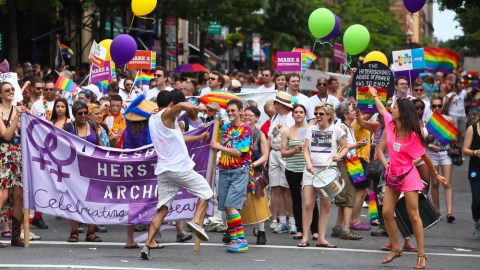What All Civil Rights Movements Must Have in Common

Individual differences each have only a limited number of affected individuals. And if we fight for only one difference at a time it’s difficult for us to make progress. If we say that everyone who is in some way unfree now should be free then as we engage we are really bringing about a profound social transformation. So identity movements have tended to go one at a time. There was women’s suffrage. There was the civil rights movement. There have since been the gay rights movement and the disability rights movement.
Each of these movements has borrowed from the one that came before. So there was a lot of language in the civil rights movement that drew from early feminism. And there was a lot of language in the gay rights movement that drew from the civil rights movement. And the disability rights movement used some of the language from the gay rights movement. And the tendency has been for each group upon consolidating its power to think that it wants nothing to do with these other groups that are somehow dragging everyone down again.
But the reality is that all of these freedoms are very elaborately and tightly interconnected. So if we have a tolerant society that tolerates all kinds of difference it will be better for women. It will be better for black people. It will be better for gay or disabled people than a society which tolerates one kind of difference and remains intolerant of other kind of difference. There’s a generosity of spirit that needs to be braided into the national political discourse and the only way to do that is by continuing to win rights for more and more and more groups of people who are unusual or different in some way.
We live in a curious moment when medical progress is making it possible to eliminate many conditions exactly as social progress is making it possible to celebrate them. It’s better now than it ever has been to be deaf. There are more people willing to accept the idea of deaf culture and we also have the cochlear implant which means fewer and fewer children are functionally deaf. We have more and more of a dwarf rights movement and more and more people who have made a public stance about the meaningfulness of their experience as dwarves at exactly the same moment that we have the development of a pharmacological compound that may cause the gene for achondroplasia to be suppressed so that people with that gene will grow to full height.
We have people with Down Syndrome accomplishing more than they’ve ever accomplished before and living longer and healthier lives at the same time that we’re developing blood tests that would allow people to detect a pregnancy with DS earlier and earlier in pregnancy and to terminate such pregnancies if they were so inclined. So it’s a little like that moment in grand opera when the hero realizes he loves the heroine exactly as she lies expiring on the sofa.
I think in a larger sense that our social progress is contingent on our continuing all the time to look what is the next group of people we can accept? Who are the others we can accept? Having grown up at a time when being gay was an illness and having an adulthood in which it’s an identity and which I with my husband and our children are warmly received almost every place we would wish to go, I know it’s possible for these things to change. And I wonder deeply what the things are that will change from being commonly seen as illnesses to being commonly seen as identities over the next 25 years.
And I don’t know what they will be but I know there will be some. I know that we’re in a process in which we are saying more and more everyone is human. And if we can get to the point at which we fully accept and celebrate that idea we make for a better world. And each of these rights movements is pushing us toward that ideal.
In Their Own Words is recorded in Big Think’s studio.
Image courtesy of Shutterstock





